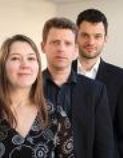|
Symphony
SRS SEASON ENDS WITH RESOUNDING TA-TA-TA-BANG
by Terry McNeill
Sunday, June 1, 2025
Symphony
YOUTHFUL VIRTUOSITY ON DISPLAY AT USO'S MAY CONCERTS
by Peter Lert
Saturday, May 17, 2025
Symphony
MYSTICAL PLANETS AND LIVELY GERSHWIN ORTIZ AT FINAL SRS CONCERT
by Peter Lert
Sunday, May 4, 2025
Symphony
VSO'S CONCERT MUSIC OF TIME, MUSIC OF PLACE
by Peter Lert
Sunday, April 27, 2025
Choral and Vocal
VOCAL ELEGANCE AND FIRE AT THE 222'S RECITAL APRIL 26
by Pamela Hicks Gailey
Saturday, April 26, 2025
CANTIAMO SONOMA SINGS AN INSPIRED GOOD FRIDAY MOZART REQUIEM CONCERT
by Pamela Hicks Gailey
Friday, April 18, 2025
DRAMATIC SHOSTAKOVICH SYMPHONY CLOSES PHILHARMONIC'S 25TH SEASON
by Terry McNeill
Sunday, April 13, 2025
LARGE COLLEGE OF MARIN AUDIENCE GREETS STOPHER ARTISTRY
by Terry McNeill
Saturday, April 5, 2025
Chamber
FRISSON DELIVERS SHIVERS OF DELIGHT
by Abby Wasserman
Sunday, March 30, 2025
OLD AND MOSTLY NEW IN SRS MARCH CONCERT IN WEILL
by Peter Lert
Saturday, March 22, 2025
|
 |
 Felici Piano Trio |
FELICITOUS FELICI TRIO IN MILL VALLEY
by Kenn Gartner
Sunday, April 19, 2009
Mill Valley’s Chamber Music Society provided a nearly full audience April 19 with a superb Felici Trio concert in the Mount Tamalpais Methodist Church. Finally a piano trio with elegant ensemble skills, bravura and deft musicality. You should’a been there.
The Felici - violinist Rebecca Hang, cellist Brian Schuldt, pianist Paulina Zamora - is an exceedingly personable ensemble. With piano lid at full mast and rich string sound, the audience was treated to a set of three outstanding performances. Additionally, in verbal notes from the stage Hang and Schuldt humanized these artists for this audience, extending the charm of this ensemble to the assembly.
They began with Beethoven’s Geister (Ghost) Trio, Opus 70, No. 1, in D Major. Beethoven, a virtuoso pianist, wrote dashing parts, and we were treated a slam-bang performance of an exciting work including all the repeats in the first movement. The repeat in those times was performed so the audience might make mental notes about the initial musical material and then marvel at the compositional dexterity of the composer. A bit more variety in the repeats might have made this performance even more memorable. One should remember that Beethoven’s violin and cello sonatas are for piano with violin or cello obbligato. Thus if you have a violinist or cellist lying around the house, and you play piano, perhaps they would care to make music with you. Zamora took the eighth-note reins and never let go, and the scale passages in the third movement were elegant and bell like.
The next work was probably new to the majority of the audience, John Ireland’s Phantasie Trio in A minor. Written in 1908, this short and attractive one-movement work approximates the sonata-allegro in form, but the written word cannot express what the ear should hear. Like Beethoven, Ireland’s oeuvre focuses on writing for piano ensemble, and seems to be coming into great favor. Chandos has recently released a two-CD set of Ireland’s chamber works.
Anton Dvorak’s Piano Trio in E Minor, Op. 90 (Dumky) completed the program. Like the Beethoven, this Trio which is also revolutionary and does not have a sonata-allegro movement or possess a set of variations. However, it does have six movements for which Dvorak created original Czechoslovakian melodies, based on his familiarity with Czech folk song and folk dance. Dumka is an alternation of yearning melancholy and wild gaiety, and the foot stomping was particularly pronounced in the first dumka. A problem with the performance was the constant wee retards in the first dumky as the ensemble approached a cadence, similar to beginning pianists who schlep at the close of Bach’s phrases. However, pianist Zamora provided fleeting momentum including some choice etincelles. Moreover, speaking of optimism and fighting against fate, the work ends with the Picardy Third, a major harmony in a minor piece.
The program notes, both written and verbal, were overly flowery. In my subjective view, Beethoven, writing his Heiligenstadt Testament in October 1802, has already decided several things: he will not commit suicide as he has more music to create; the world will understand him after he is dead; and, though not too much of a stretch, the Romantic era is starting. The “Ghost” trio was composed in 1808. The question arose at the time as to why the Trio was so named, and simply stated, the sketches for the Trio’s second movement duplicated in large measure those for a witch’s chorus for an opera dealing with Macbeth. If one ascribes romantic feelings to this movement, it just reinforces the idea that Beethoven was probably the first Romantic composer.
My seatmates enjoyed the concert as well, and later their mother, violinist Rebecca Hang, asked me if they behaved. Of course they did, it was a great concert.
|

